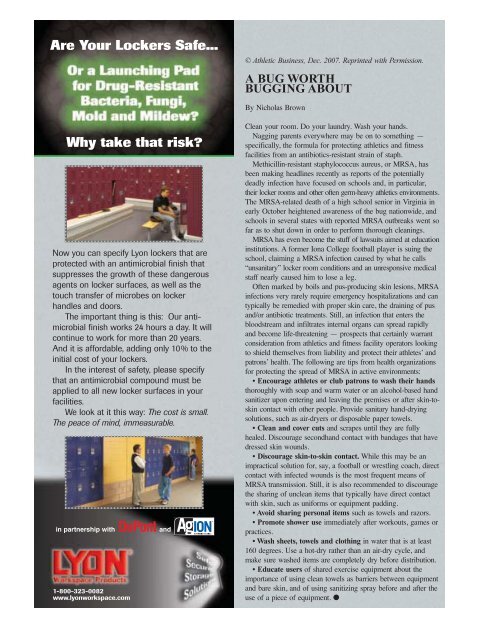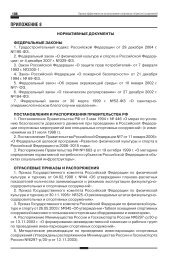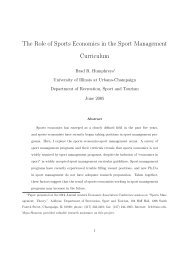Environmental Education
Environmental Education
Environmental Education
Create successful ePaper yourself
Turn your PDF publications into a flip-book with our unique Google optimized e-Paper software.
Are Your Lockers Safe...<br />
Why take that risk?<br />
Now you can specify Lyon lockers that are<br />
protected with an antimicrobial finish that<br />
suppresses the growth of these dangerous<br />
agents on locker surfaces, as well as the<br />
touch transfer of microbes on locker<br />
handles and doors.<br />
The important thing is this: Our antimicrobial<br />
finish works 24 hours a day. It will<br />
continue to work for more than 20 years.<br />
And it is affordable, adding only 10% to the<br />
initial cost of your lockers.<br />
In the interest of safety, please specify<br />
that an antimicrobial compound must be<br />
applied to all new locker surfaces in your<br />
facilities.<br />
We look at it this way: The cost is small.<br />
The peace of mind, immeasurable.<br />
in partnership with DuPont and<br />
1-800-323-0082<br />
www.lyonworkspace.com<br />
© Athletic Business, Dec. 2007. Reprinted with Permission.<br />
A BUG WORTH<br />
BUGGING ABOUT<br />
By Nicholas Brown<br />
Clean your room. Do your laundry. Wash your hands.<br />
Nagging parents everywhere may be on to something —<br />
specifically, the formula for protecting athletics and fitness<br />
facilities from an antibiotics-resistant strain of staph.<br />
Methicillin-resistant staphylococcus aureus, or MRSA, has<br />
been making headlines recently as reports of the potentially<br />
deadly infection have focused on schools and, in particular,<br />
their locker rooms and other often germ-heavy athletics environments.<br />
The MRSA-related death of a high school senior in Virginia in<br />
early October heightened awareness of the bug nationwide, and<br />
schools in several states with reported MRSA outbreaks went so<br />
far as to shut down in order to perform thorough cleanings.<br />
MRSA has even become the stuff of lawsuits aimed at education<br />
institutions. A former Iona College football player is suing the<br />
school, claiming a MRSA infection caused by what he calls<br />
“unsanitary” locker room conditions and an unresponsive medical<br />
staff nearly caused him to lose a leg.<br />
Often marked by boils and pus-producing skin lesions, MRSA<br />
infections very rarely require emergency hospitalizations and can<br />
typically be remedied with proper skin care, the draining of pus<br />
and/or antibiotic treatments. Still, an infection that enters the<br />
bloodstream and infiltrates internal organs can spread rapidly<br />
and become life-threatening — prospects that certainly warrant<br />
consideration from athletics and fitness facility operators looking<br />
to shield themselves from liability and protect their athletes’ and<br />
patrons’ health. The following are tips from health organizations<br />
for protecting the spread of MRSA in active environments:<br />
• Encourage athletes or club patrons to wash their hands<br />
thoroughly with soap and warm water or an alcohol-based hand<br />
sanitizer upon entering and leaving the premises or after skin-toskin<br />
contact with other people. Provide sanitary hand-drying<br />
solutions, such as air-dryers or disposable paper towels.<br />
• Clean and cover cuts and scrapes until they are fully<br />
healed. Discourage secondhand contact with bandages that have<br />
dressed skin wounds.<br />
• Discourage skin-to-skin contact. While this may be an<br />
impractical solution for, say, a football or wrestling coach, direct<br />
contact with infected wounds is the most frequent means of<br />
MRSA transmission. Still, it is also recommended to discourage<br />
the sharing of unclean items that typically have direct contact<br />
with skin, such as uniforms or equipment padding.<br />
• Avoid sharing personal items such as towels and razors.<br />
• Promote shower use immediately after workouts, games or<br />
practices.<br />
• Wash sheets, towels and clothing in water that is at least<br />
160 degrees. Use a hot-dry rather than an air-dry cycle, and<br />
make sure washed items are completely dry before distribution.<br />
• Educate users of shared exercise equipment about the<br />
importance of using clean towels as barriers between equipment<br />
and bare skin, and of using sanitizing spray before and after the<br />
use of a piece of equipment. ●
















